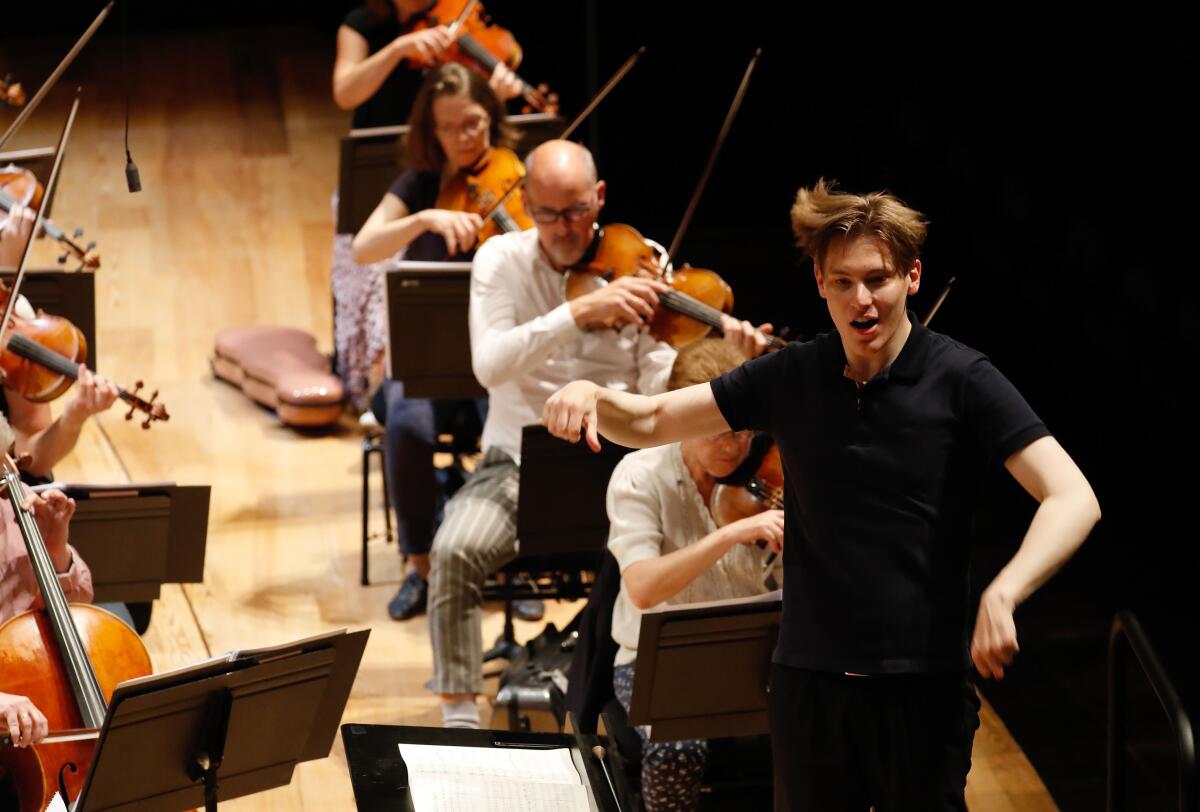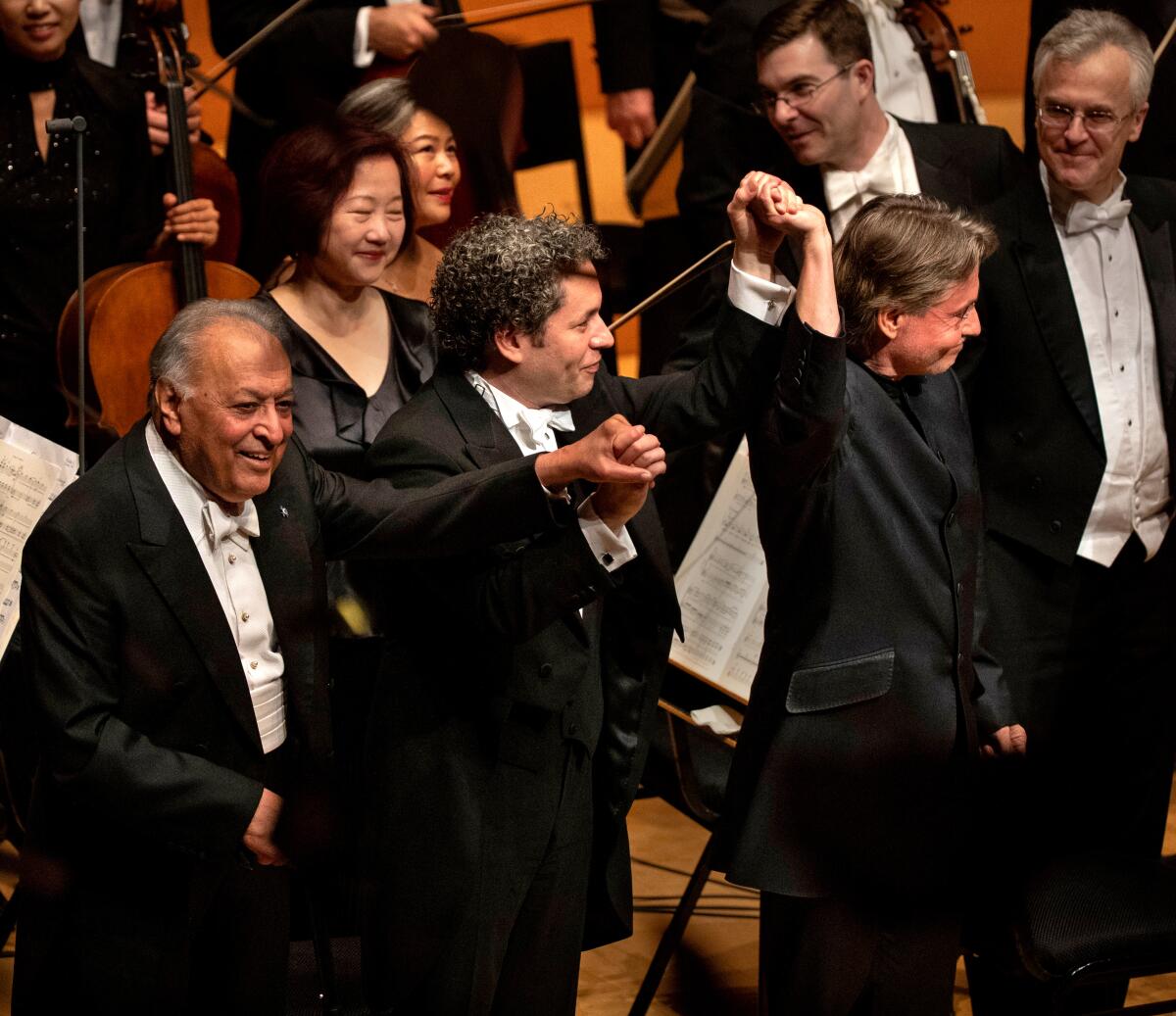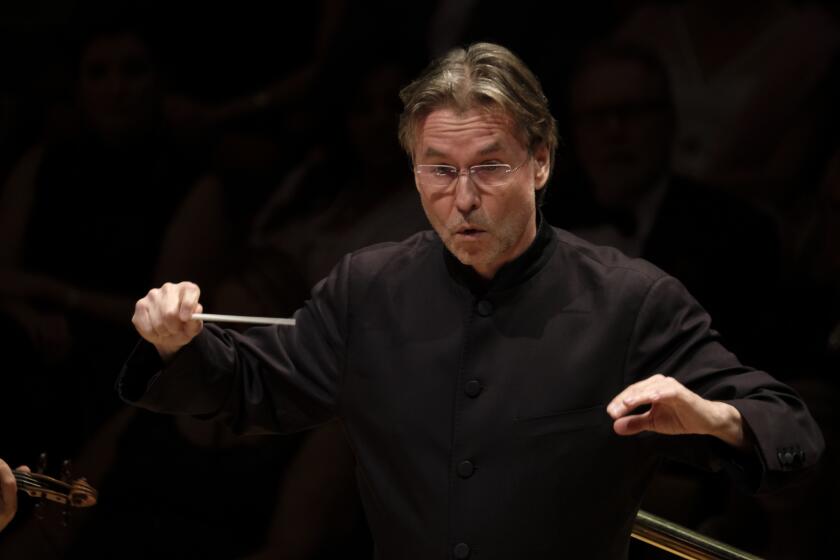Why the search for the next Gustavo Dudamel is full of hope — and hazards

- Share via
The excited media coverage last week of the Chicago Symphony Orchestra’s choice for a new music director treated 28-year-old Finnish conductor Klaus Mäkelä like the second coming of Gustavo Dudamel.
In a recent streaming documentary about Mäkelä, French director Bruno Monsaingeon calls him already the greatest conductor of the 21st century. Monsaingeon should know. His filmed interviews with the likes of Glenn Gould, Sviatoslav Richter, Yehudi Menuhin, Maurizio Pollini and other 20th century classical giants are indispensable. In “Klaus Mäkelä — Towards the Flame,” he shows his gregarious subject full of life, full of music and full of himself. He’s a terrific musician and already an exceptionally accomplished conductor whose rise has been meteoric. Orchestra players respond warmly and robustly to him. He conveys a sense of wonder.
He could be a fabulous choice for Chicago. Then again, he could, and Chicago could, be making an irresponsible mistake. Same goes for the Royal Concertgebouw Orchestra in Amsterdam. Mäkelä will become music director of two of the world’s most formidable orchestras in 2027. Will he be ready? He’s in many ways ready now. But being ready is just the beginning. What happens next is the bigger question.
What might a young music director mean to an orchestra and to a city when an amazing crop of international and, for the first time, diverse young maestros and maestras is upon us? The implications go far beyond that, as we consider the education of an artist in a world in which meteoric and media-oric are pretty much the same thing.
Mäkelä is a product of Finland’s uniquely rich musical life. He first picked up a baton at 12 in a kiddie conducting class and later studied with conducting guru Jorma Panula, as did Esa-Pekka Salonen, Susanna Mälkki and dozens more conductors who populate the world’s podiums.
At 21, Mäkelä was appointed principal guest conductor of the Swedish Radio Symphony Orchestra for three years. The Oslo Philharmonic signed him at 22 as chief conductor. The Orchestre de Paris nabbed him at 24. His contracts for both run through the 2026-27 season, but he says he hopes to still keep one toe in Oslo and another in Paris while beginning in Amsterdam and Chicago. Meanwhile, he lives in Finland.

A dashing presence, Mäkelä quickly became a media sensation. The classical music and dance website medici.tv has videos of a dozen Mäkelä concerts along with interviews and the Monsaingeon documentary. Decca Records has been busy recording Mäkelä in Oslo and Paris. The Chicago Symphony has streams of recent concerts with its music-director designate. YouTube goes without saying. European radio stations broadcast his concerts regularly.
Mäkelä’s highly polished Decca recordings — in particular a set of the complete Sibelius symphonies from Oslo and Stravinsky’s “Petrushka” and “The Rite of Spring” from Paris — reveal a conductor with an ear for glorious orchestral sound. He can linger, luxuriating on every instrumental detail in slow movements, and he can happily sprint past them all when speed and propulsion are required. He knows where he’s going but he takes safe paths. His Sibelius is reverential, his Stravinsky without bite. These recordings are carefully made calling cards.
A Chicago Symphony broadcast of Mahler’s Fifth Symphony from February, when it was already widely rumored that Mäkelä would succeed Riccardo Muti, is mightily impressive, especially how he brings out the exceptional fullness of the orchestra’s trademark sound. When he steps on it, and you go along for the thrill of it.
That character, depth, emotional intensity lie on the surface need not be a problem. All that can wait. It comes from living, from experience, from knowing. You don’t conduct Mahler, you grow into Mahler. Listening to this Mahler, it is easy to see why Chicago signed Mäkelä. Listening to this Mahler, it also should be easy to see why Chicago’s signing Mäkelä could be cause for concern.
Love him or hate him, Philip Glass is inescapable. His 20 piano etudes have become essential listening, his impact on three generations of artists indelible.
The desire everywhere is to replicate the Los Angeles Philharmonic’s unique success in developing not just Dudamel, but also Salonen and Zubin Mehta before him. Three times the L.A. Phil took a chance with a dashing young conductor who had made a splash in his 20s but still had a lot to learn about repertory, relationships, fame and themselves. Three times the L.A. Phil made history.
Mehta arrived at 26 in 1962 and remained with the orchestra for 16 seasons. Salonen was 26 when he made his U.S. debut conducting the L.A. Phil in 1984, and eight years later he became music director, staying 17 seasons. Dudamel, who followed Salonen, was 28 when he took over the L.A. Phil, and he will have finished 17 seasons when his contract ends in 2026. Each conductor had prominent international careers guest conducting while in L.A. Mehta was music advisor of the Israel Philharmonic Orchestra, and Dudamel has continued his relationship with Venezuela’s El Sistema music education program. But L.A. became their principal residence. The conductors became part of the civic life. L.A. made them who they are today, and they made the L.A. Phil what it is today.
That could not have happened overnight. It could not have happened without strong leadership at the L.A. Phil. It could not have happened without an open-minded audience. It most certainly could not have happened in the glare of the traditional European and East Coast classical music establishment. There were no impossible expectations to be the greatest conductor of their time at 28. Instead, they were highly promising young talents who had the advantage of wise, visionary and savvy leaders of the L.A. Phil: Ernest Fleischmann for Mehta and Salonen followed by Deborah Borda for Salonen and Dudamel.
In Mehta’s case, in attempting to re-create the honeyed sound of the Vienna Philharmonic, he wound up creating an exuberantly fleshy and flashy L.A. orchestral sound altogether new that, in bestselling recording after recording, stunned the orchestral world. For Salonen, L.A. opened up his European modernist sensibility to far broader musical influences as both composer and conductor. Angelenos allowed Dudamel to be crazy, to experiment, to fail, to learn.

Conductor Esa-Pekka Salonen’s statement about the San Francisco Symphony board has crucial ramifications for arts organizations including the L.A. Phil.
That is not the road Mäkelä has taken. He faces the bright glare of celebrity, where mistakes become missteps, not experiments. He will have to grow on his own. And he is not walking into necessarily easy situations.
One of the most important things young conductors learn by doing is making relationships with orchestras. That takes time and experience. Both Chicago and the Concertgebouw are traditional institutions. In Amsterdam, in particular, Mäkelä will face an orchestra with a history of souring on its music directors and resisting change. Indeed, Amsterdam’s transformative new music and early music scenes developed in part as a rebellion to the stodgy Concertgebouw and all it stood for.
Times may be changing, but the Concertgebouw still has its pockets of conservatism. Chicago should be more welcoming, but it is its own world. The worry is that Mäkelä will be required to find a one-size-fits-all style before he has the opportunity to find himself. Plus, as he’s already learned, relationships are tricky. You have to put a lot into them, and they don’t always work out.
For a brief time last year, he and pianist Yuja Wang were classical music’s “It” couple. The romance was great for audiences while it lasted. Some of his most exciting concerts were with her. But now orchestras are busily seeking out last-minute soloist replacements for Mäkelä’s concerts in which she’s dropped out. Building relationships with a hundred musicians in Oslo, another hundred in Paris, while beginning new relationships with a hundred in Amsterdam and another hundred Chicago is a recipe for superficiality. You make nice and move on. There is little room for depth.
Nor can chemistry between an orchestra and conductor always be predicted, especially when it comes to young conductors. We had an example of that a few years ago when the gifted young French conductor Lionel Bringuier became music director of the Tonhalle Orchestra in Zurich after his apprenticeship at the L.A. Phil under Salonen and Dudamel. At first he appeared to bring a welcome and lively, fresh quality to a stodgy institution. Before long, stodgy Zurich removed the welcome mat.
All of these issues must weigh heavily on an L.A. Phil in search of a chief executive and a music director. How, then, might the L.A. Phil maintain its position as an orchestral leader in its own curious leaderless moment? Rather than, like everyone else, seeking out youth, might a music director with a little actual experience prove to be the most radical idea for the current needs of the most radical major orchestra?
The famed Italian pianist Maurizio Pollini died Saturday. Listen to his music, and you’ll still hear life in every note.
More to Read
The biggest entertainment stories
Get our big stories about Hollywood, film, television, music, arts, culture and more right in your inbox as soon as they publish.
You may occasionally receive promotional content from the Los Angeles Times.














